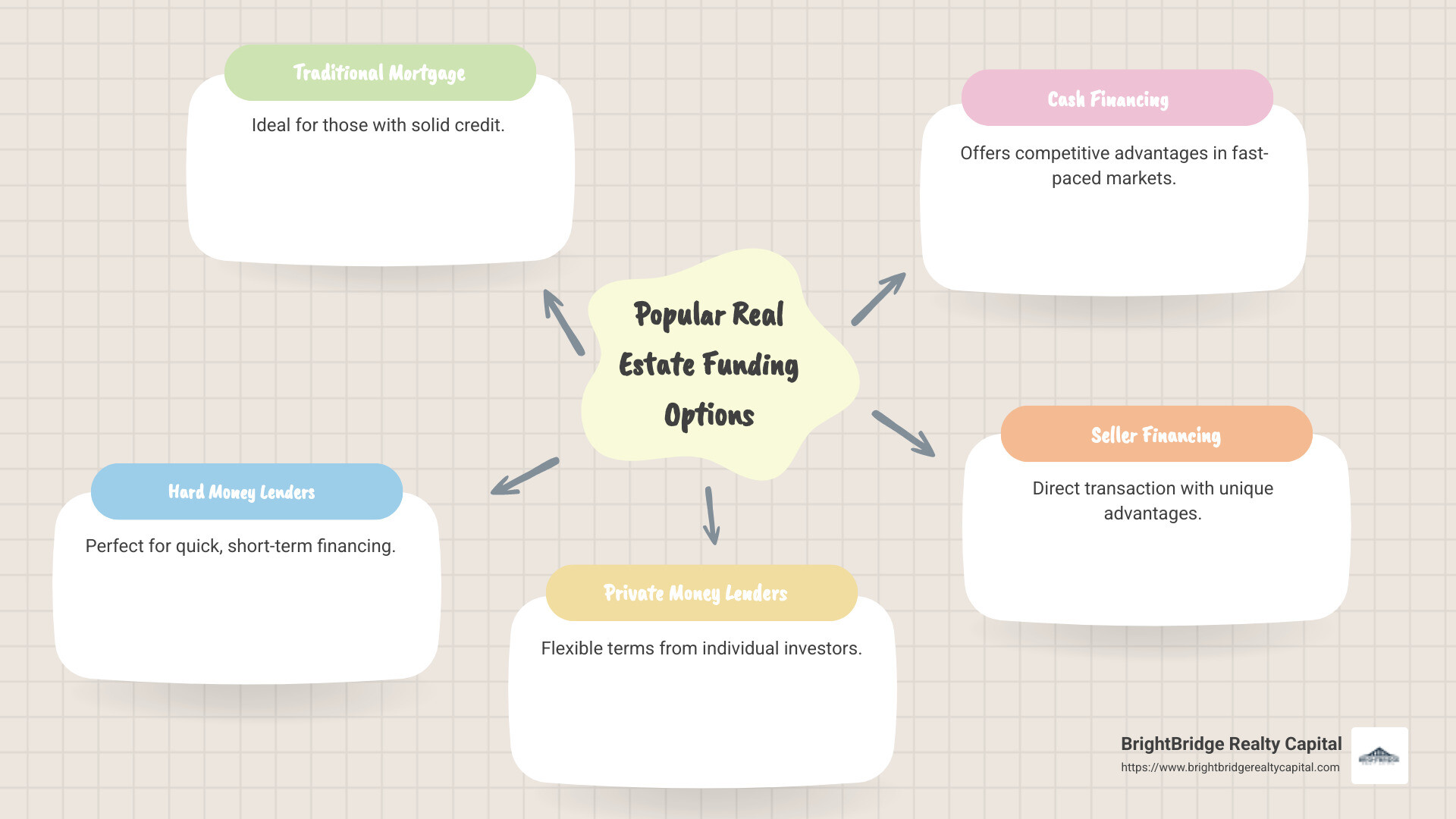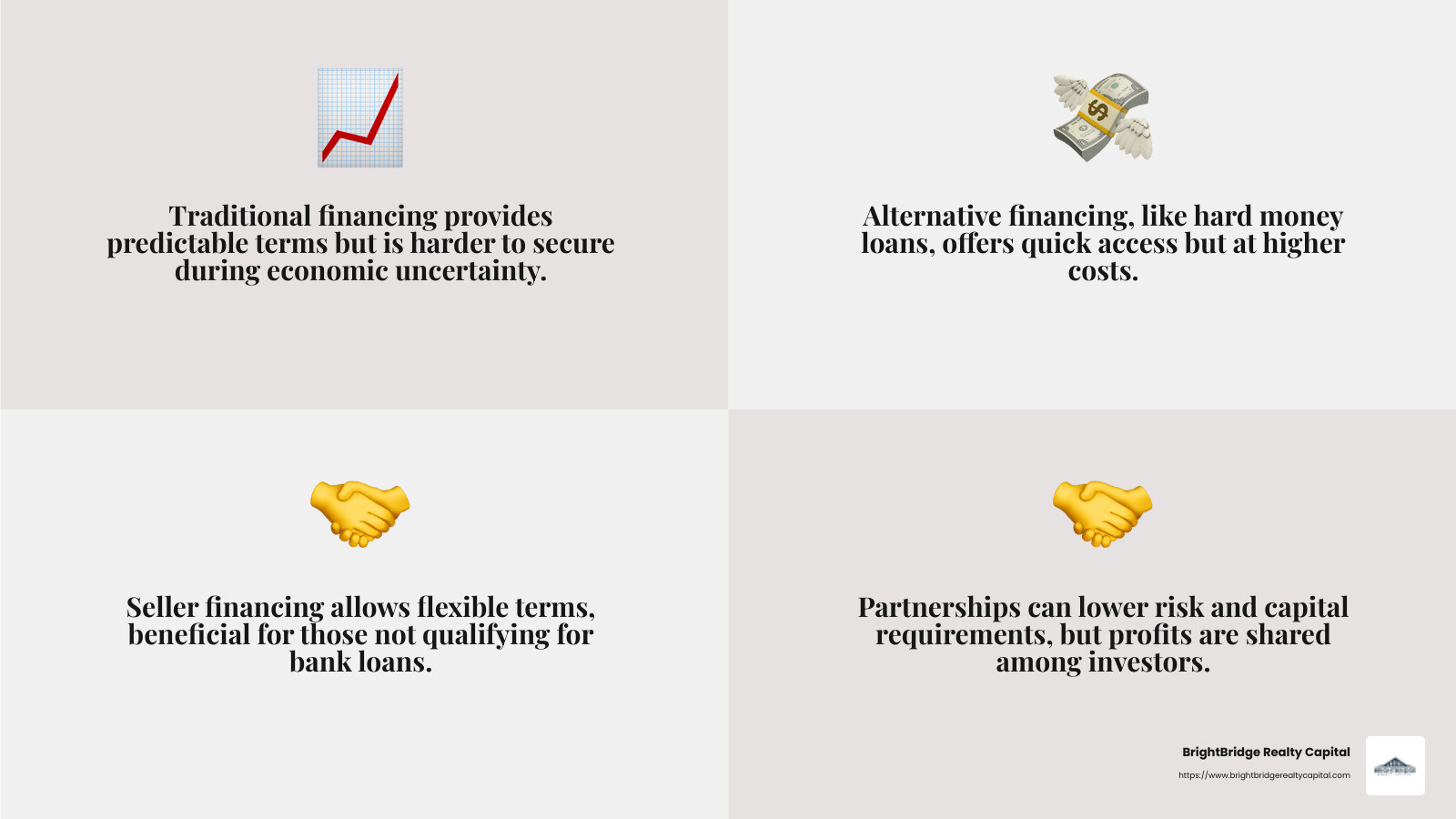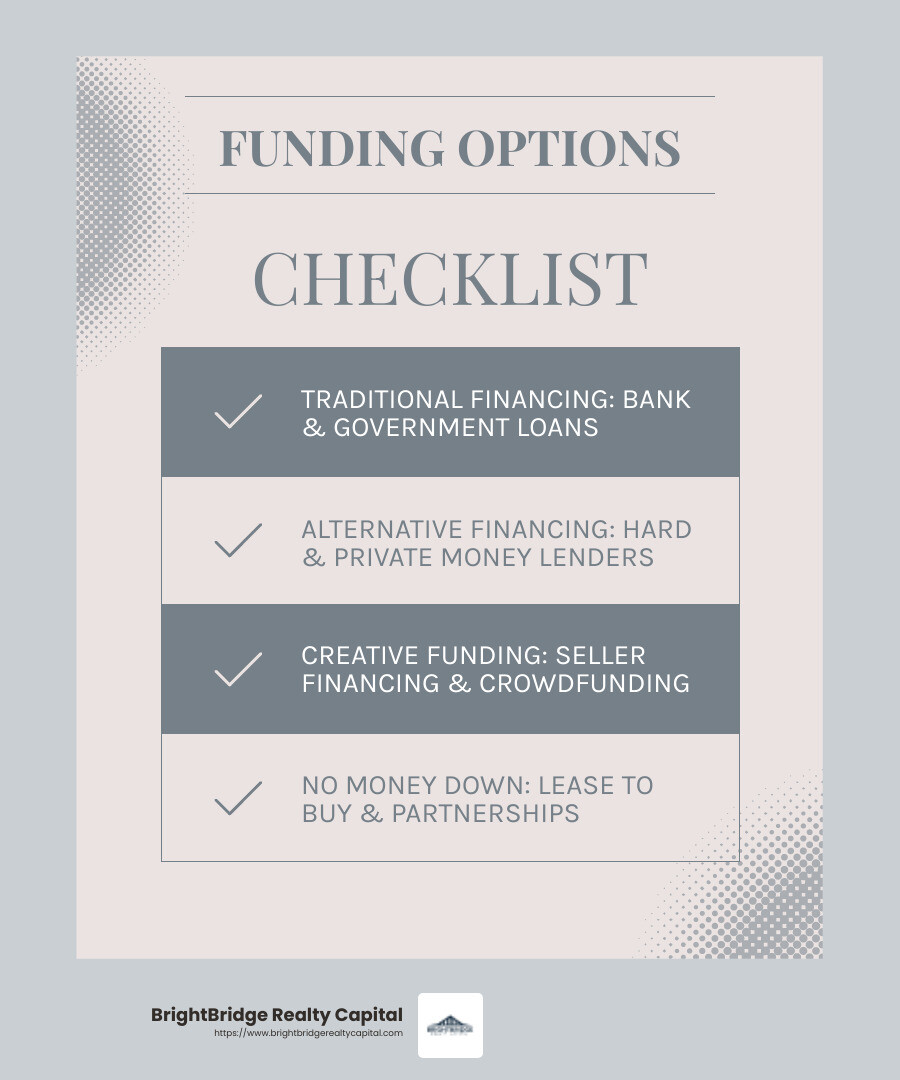Residential Real Estate Funding: Your Comprehensive Guide

Real estate funding options open doors to powerful opportunities for investors eager to expand their portfolios. Understanding these options is key for anyone looking to steer the competitive real estate market. Here's a quick look at some popular choices:
- Traditional Mortgage: Ideal for those with solid credit.
- Hard Money Lenders: Perfect for quick, short-term financing.
- Private Money Lenders: Flexible terms from individual investors.
- Cash Financing: Offers competitive advantages in markets.
- Seller Financing: Direct transaction with unique advantages.
Real estate financing is not just about purchasing properties—it's a crucial tool for growing wealth. By tapping into a variety of funding options, investors can diversify their portfolios, increase cash flow, and benefit from property appreciation.
Investing in real estate, whether for a fix-and-flip project or rental portfolio growth, requires a nuanced understanding of financing methods. Choosing the right funding option can mean the difference between capitalizing on a lucrative opportunity or watching it slip away.
Navigating the real estate financing landscape might seem daunting at first, but with the right knowledge and resources, it becomes a manageable and rewarding endeavor. We will explore these options to help you make informed decisions custom to your investment goals.

Important Real estate funding options terms:
Understanding Real Estate Funding Options
When it comes to real estate funding options, there are three main categories you should know: traditional financing, alternative financing, and creative funding. Each offers unique benefits and challenges, so understanding them is crucial for making informed investment decisions.
Traditional Financing
Traditional financing is the most common route for real estate investors. It involves borrowing from banks or financial institutions, typically through a mortgage. This option is well-suited for those with strong credit histories and stable incomes.
Pros of Traditional Financing:
- Predictable Terms: Fixed interest rates and structured repayment schedules.
- Regulated Process: Comes with consumer protections and standard procedures.
- Long-Term Solution: Ideal for investors looking to hold properties over time.
However, traditional financing can be challenging to secure in times of economic uncertainty. According to the Mortgage Bankers Association, commercial real estate borrowing has seen a significant decline, with a 47% drop from 2022 to 2023. This trend highlights the need to consider alternative options when traditional lenders tighten their criteria.
Alternative Financing
Alternative financing steps in where traditional methods fall short. Options like hard money loans and mezzanine financing offer flexibility but come with higher interest rates and shorter terms.
Hard Money Loans: These are asset-based loans, often used for quick purchases or renovations. They are less regulated, which speeds up the process but also increases risk.
Mezzanine Financing: A hybrid of debt and equity, this option provides more capital than a standard loan. It's ideal for investors needing substantial funds but willing to pay higher interest rates.
Alternative financing is a favorite among investors who need to act fast or can't qualify for traditional loans. While these options can be costly, they provide a bridge to longer-term solutions.
Creative Funding
Creative funding strategies offer unique approaches to financing real estate projects. These include seller financing, crowdfunding, and partnerships.
Seller Financing: Here, the seller acts as the lender, allowing flexible terms. This can be advantageous for buyers who may not meet conventional lending criteria.
Crowdfunding: Platforms pool resources from multiple investors, making it easier to access larger deals. This method reduces individual capital outlay but requires shared decision-making.
Partnerships: Teaming up with other investors can lower individual risk and capital requirements. However, it also means sharing control and profits.
Creative funding methods are excellent for those seeking innovative solutions to real estate investment challenges. They offer flexibility and the potential for high returns, but they also demand careful planning and due diligence.

In summary, real estate funding encompasses a range of options, each suited to different needs and circumstances. By understanding these methods, you can choose the right path to achieve your investment goals.
Top Real Estate Funding Options
When diving into real estate investing, understanding the top funding options is key. Let's break down the five main real estate funding options: traditional mortgage, hard money lenders, private money lenders, cash financing, and seller financing.
Traditional Mortgage
A traditional mortgage is often the go-to choice for many investors. It's a long-term loan from a bank or financial institution, usually with a fixed interest rate. This option is ideal for those with a solid credit score and stable income.
Why Choose a Traditional Mortgage?
- Predictability: Fixed rates mean your payments stay the same over time.
- Consumer Protections: Regulated processes and protections.
- Long-Term Investment: Perfect for those planning to hold onto properties.
However, it's worth noting that commercial real estate borrowing has dropped significantly, indicating stricter lending criteria in recent years.
Hard Money Lenders
Hard money lenders provide short-term, asset-based loans. They are popular among investors who need quick cash for property purchases or renovations. These loans are less regulated, allowing for faster approvals but at higher interest rates.
Pros of Hard Money Loans:
- Fast Access: Quick approvals and funding.
- Flexible Terms: Less stringent credit requirements.
- Short-Term Solution: Great for flipping properties.
Yet, the higher costs and risks make them less suitable for long-term investments.
Private Money Lenders
Private money lenders are individuals, not institutions, offering loans based on personal terms. They are often friends or acquaintances of the investor.
Advantages of Private Money Loans:
- Flexibility: Terms can be negotiated to suit both parties.
- Personal Touch: Direct relationship with the lender.
While these loans offer flexibility, they can strain personal relationships if not managed carefully.
Cash Financing
With cash financing, investors use their own funds to purchase properties outright. This method eliminates the need for loans and interest payments.
Benefits of Cash Financing:
- Speed: Quick purchases without waiting for loan approvals.
- Negotiation Power: Cash buyers often have an edge in negotiations.
- No Interest: No monthly payments or interest to worry about.
Cash financing is straightforward but requires having significant capital available.
Seller Financing
In seller financing, the seller acts as the lender, allowing the buyer to make payments directly to them. This can be a win-win for both parties.
Why Opt for Seller Financing?
- Flexible Terms: Customizable payment plans and interest rates.
- Quick Closings: Faster transactions without bank delays.
This option is especially beneficial for buyers who might not qualify for traditional loans.

In conclusion, each of these real estate funding options offers unique advantages and challenges. Your choice will depend on your financial situation, investment goals, and risk tolerance. Understanding these options will help you make informed decisions and maximize your investment potential.
Real Estate Funding Options for Beginners
For those new to real estate investing, navigating the funding landscape can seem daunting. However, several beginner-friendly options can make entering the market more accessible.
FHA Loans
FHA loans are a popular choice for first-time homebuyers. Backed by the Federal Housing Administration, these loans are designed for those with lower credit scores or limited funds for a down payment.
Key Features of FHA Loans:
- Low Down Payment: As little as 3.5% down.
- Easier Qualification: More lenient credit requirements.
- Government-Backed: Provides added security to lenders.
These loans are perfect for those who want to break into real estate without a significant upfront investment. However, they do require mortgage insurance premiums, which can increase overall costs.
VA Loans
For military veterans and their families, VA loans offer an excellent opportunity to purchase property with favorable terms. Guaranteed by the U.S. Department of Veterans Affairs, these loans provide numerous benefits.
Advantages of VA Loans:
- No Down Payment: Often require zero down payment.
- No Private Mortgage Insurance (PMI): Saves you money monthly.
- Competitive Interest Rates: Generally lower than conventional loans.
VA loans are a solid option for those who qualify, providing a pathway to homeownership with minimal barriers.
Lease to Buy
Lease to buy agreements allow you to rent a property with the option to purchase it later. This can be a strategic choice for those who need time to improve their credit or save for a down payment.
Pros of Lease to Buy:
- Test the Property: Live in the home before committing to a purchase.
- Build Equity: A portion of rent may go towards the purchase price.
- Flexibility: Decide later if you want to buy.
While this option offers flexibility, have a clear agreement with the seller to avoid misunderstandings.
Peer-to-Peer Lending
Peer-to-peer (P2P) lending is an innovative way to fund real estate purchases. Through online platforms, you can connect with individual lenders willing to finance your investment.
Benefits of P2P Lending:
- Access to Capital: Secure funding even with a modest credit history.
- Competitive Rates: Potentially lower than traditional lenders.
- Speed: Quick approval processes.
P2P lending democratizes real estate funding, making it accessible to a broader audience. However, loan terms and interest rates can vary, so it's crucial to review agreements carefully.
These beginner-friendly real estate funding options provide various pathways to enter the market, each with its own set of benefits and considerations. Whether you're leveraging government-backed loans or exploring innovative lending platforms, understanding your options is key to making informed investment decisions.
Advanced Real Estate Funding Strategies
For seasoned investors, exploring advanced real estate funding options can reveal opportunities to maximize returns and diversify investment strategies. Let's dig into some sophisticated approaches that can lift your real estate game.
Convertible Debt
Convertible debt is a financing option that blends the features of loans and equity investment. Initially, it functions as a loan, but lenders have the option to convert the debt into equity in the property or company.
Why Consider Convertible Debt?
- Lower Interest Rates: Often comes with lower rates due to potential equity conversion.
- Flexibility: Borrowers can choose between cash repayment or equity conversion.
- Appreciation Potential: Lenders benefit from property appreciation if they convert to equity.
This strategy is ideal for projects with high appreciation potential, aligning the interests of both borrowers and lenders.
Mezzanine Financing
Mezzanine financing acts as a hybrid between debt and equity, typically used to fill the gap between a property's senior debt and equity. It's a popular choice for large commercial projects.
Key Features of Mezzanine Financing:
- Subordinate to Senior Debt: It sits below senior debt but above equity in the capital stack.
- Higher Returns: Offers higher yields due to increased risk.
- Flexible Terms: Negotiable repayment terms and potential for equity conversion.
This option is suitable for investors looking to leverage large-scale projects without diluting ownership significantly.
Self-Directed IRA
A self-directed IRA allows investors to use retirement funds to invest in real estate. Unlike traditional IRAs, which typically focus on stocks and bonds, self-directed IRAs provide more control over investment choices.
Advantages of Self-Directed IRAs:
- Diverse Investment Options: Invest in properties, not just stocks.
- Tax Benefits: Enjoy tax-deferred or tax-free growth.
- Control: Greater autonomy over investment decisions.
This strategy requires careful management to comply with IRS regulations but offers significant growth potential through real estate investments.
Subject-To Financing
Subject-to financing is a creative strategy where the buyer takes over the existing mortgage of a property, keeping the original loan terms intact.
Benefits of Subject-To Financing:
- No New Loan Approval: Bypass traditional loan processes.
- Lower Costs: Avoid new loan fees and potentially lower interest rates.
- Speed: Faster property acquisition.
While this method offers unique advantages, it demands a thorough understanding of existing mortgage terms and potential legal implications.
These advanced real estate funding strategies open up a world of possibilities for experienced investors. Whether you're leveraging convertible debt for flexibility or using a self-directed IRA for tax advantages, these options require a nuanced understanding of the market and investment goals.
Frequently Asked Questions about Real Estate Funding Options
What is real estate financing?
Real estate financing is the process of securing funds to purchase, develop, or invest in property. It involves various methods and sources, each with its own terms and conditions.
Methods and Sources:
- Traditional Financing: Includes bank loans and government-backed loans like FHA and VA loans.
- Alternative Financing: Options like hard money lenders, private money lenders, and cash financing.
- Creative Funding: Strategies such as seller financing, peer-to-peer lending, and crowdfunding.
These options help investors and homebuyers access the capital needed to achieve their real estate goals.
How can I secure real estate financing with no money down?
Securing real estate financing with no money down is challenging but possible with the right strategies.
Creative Solutions:
- Lease to Buy: Rent with the option to purchase later, often with rental payments contributing to the purchase price.
- Subject-To Financing: Take over an existing mortgage without having to qualify for a new loan.
- Partnerships: Team up with investors who can provide the capital in exchange for equity or profit sharing.
These methods require careful negotiation and clear agreements to protect all parties involved.
What are the risks associated with alternative financing?
While alternative financing can offer flexibility and accessibility, it also comes with specific risks.
Interest Rates and Repayment Terms:
- Higher Interest Rates: Options like hard money loans often come with higher rates to compensate for increased lender risk.
- Shorter Repayment Terms: These may lead to higher monthly payments and pressure to refinance or sell quickly.
Investor Relations:
- Shared Control: In partnerships or crowdfunding, decision-making is shared, which can lead to conflicts.
- Regulatory Challenges: Some methods, like syndicates, face complex regulations and require thorough due diligence.
Understanding these risks is essential to making informed decisions in the real estate market.

These real estate funding options each have their advantages and pitfalls. By evaluating your financial situation and investment goals, you can choose the best path forward.
Conclusion
At BrightBridge Realty Capital, we know that securing the right funding can make or break a real estate investment. That's why we focus on providing fast closings and a seamless process to help you move forward without delay.
Fast Closings
In real estate, timing is everything. Opportunities can slip away if financing takes too long. That's where we come in. Our streamlined process allows us to close deals often within a week, ensuring you don't miss out on lucrative opportunities. By cutting out intermediaries, we offer direct lending that saves you time and money.
Seamless Process
Navigating the complexities of real estate financing can be daunting. Our goal is to make this journey as smooth as possible. From the initial application to the final payoff, our dedicated team manages every detail in-house. This means you get expert support at every step, with custom solutions that meet your specific investment needs.
Whether you're a seasoned investor or new to the game, our customized financing solutions are designed to fit your unique strategy. With our real estate funding options, you can confidently pursue your investment goals knowing that BrightBridge Realty Capital has your back.
Ready to explore your options? Learn more about our services and how we can help you succeed.


